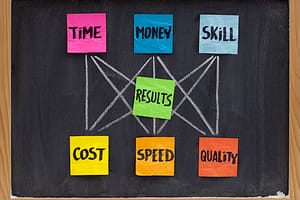Planning a business trip to the US takes time and forethought. Before boarding your plane, you need to make sure you have several documents, including a government-issued ID and a valid passport. If your passport is expired, missing, or damaged, you’ll need time to get another one.
Depending on where your passport was issued, you might have to obtain a visa to enter the United States. Getting a new passport or visa is relatively easy when your trip is still several months away, but what if you need to leave on short notice?
If you’re headed to the US on business and don’t have much time to plan ahead, here’s how you can get to your destination without getting stressed out.
1. Apply for an ESTA visa waiver
Depending on the nature of your citizenship, you might qualify for a visa waiver, which is easier and faster to secure than a visa. You won’t be able to stay in the US as long, but it may be sufficient if you’re traveling on short-term business.
According to the U.S. Bureau of Consular Affairs, “the Visa Waiver Program (VWP) enables most citizens and nationals of participating countries to travel to the United States for tourism or business for stays of 90 days or less without obtaining a visa.”
The process for obtaining an ESTA waiver for business purposes is straightforward. If you hold a passport from one of 39 countries that participate in the program—which includes the United Kingdom—you’ll qualify.
However, there are additional requirements. To qualify for ESTA, you must hold a return ticket or an onward ticket to another non-U.S. destination, and you must have an electronic passport with a chip that holds your biometric data.
Without a chipped passport, you might not be allowed to board your plane to the U.S. Another requirement is that you cannot be paid for attending professional events beyond reimbursement for your expenses.
The most important stipulation is that you can’t stay in the US for more than 90 days and you are not allowed to apply for an extension to your stay or switch to a visa. You must leave the country to apply for a visa if you wish to extend your visit.
If you don’t meet all the above requirements, you must obtain a visa to travel to the U.S.
2. Be honest about your reason for traveling
Either business and tourism are legitimate reasons to apply for an ESTA visa waiver, so it doesn’t make sense to fib. Being less than honest about why you’re traveling to the U.S. can keep you from reaching your destination.
Say you get stopped at the border because of a criminal offense committed in your teens. You might be tempted to say you’re just visiting the U.S. for fun or you’re there to work.
If you’re dressed in business attire, though, such responses will raise red flags, especially if you don’t have formal permission to work in the United States. Customs and Border Protection officers may open your suitcase and look through your belongings.
If a customs agent finds a bunch of marketing materials, they’ll question your story. Tell the truth from the moment you apply for a visa or a visa waiver. Keep your story consistent and aligned with the facts and you’ll avoid getting denied entry.
3. Study American business etiquette before you fly
Not knowing what’s expected of you in business situations can be an extreme source of stress. Do you shake hands or hug? How many hands do you use to present your business card to another person? Knowing the answers to these questions ahead of time will prevent stress and anxiety.
Business customs in the U.S. tend to be more relaxed than in other nations, but at the same time, they’re also more direct. For example, in the U.S., it’s not impolite to refuse food or drink, and executives can be extremely direct in their communications.
If you’ve never done business in the U.S., be prepared to make fast decisions and deliver straightforward responses that don’t dance around the subject.
Business étiquette can be different for every country. It’s not even the same, necessarily, for each company.
Try to study the business étiquette of your destination before you board the plane. You might not be prepared to know exactly how to behave in every situation, but knowing something about the local business practices can make the big differences less of a shock when you encounter them.
There’s no need to rush
You want your business trip to be fast and smooth, but also stress-free. If you play it right, you’ll qualify for an ESTA waiver and not have to wait for a visa.
Though you can’t make your plane fly faster, these helpful tips will support you in having a stress-free business trip.






Leave a Comment